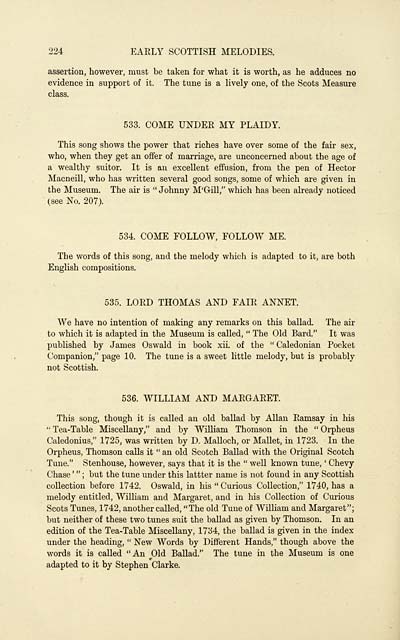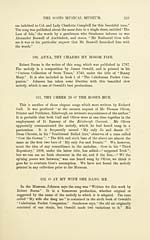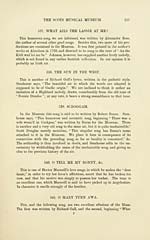Inglis Collection of printed music > Printed text > Early Scottish melodies
(246) Page 224 - Come under my plaidy
Download files
Complete book:
Individual page:
Thumbnail gallery: Grid view | List view

224 EAELY SCOTTISH MELODIES.
assertion, however, must be taken for what it is worth, as he adduces no
evidence in support of it. The tune is a lively one, of the Scots Measure
class.
533. COME UNDER MY PLAIDY.
This song shows the power that riches have over some of the fair sex,
who, when they get an offer of marriage, are unconcerned about the age of
a wealthy suitor. It is an excellent effusion, from the pen of Hector
Macneill, who has written several good songs, some of which are given in
the Museum. The air is " Johnny M'Gill," which has been already noticed
(see No. 207).
534. COME FOLLOW, FOLLOW ME.
The words of this song, and the melody which is adapted to it, are both
English compositions.
535. LORD THOMAS AND FAIR ANNET.
We have no intention of making any remarks on this ballad. The air
to which it is adapted in the Museum is called, " The Old Bard." It was
published by James Oswald in book xii. of the " Caledonian Pocket
Companion," page 10. The tune is a sweet little melody, but is probably
not Scottish.
536. WILLIAM AND MARGARET.
This song, though it is called an old ballad by Allan Ramsay in his
" Tea-Table Miscellany," and by William Thomson in the " Orpheus
Caledonius," 1725, was written by D. Malloch, or Mallet, in 1723. In the
Orpheus, Thomson calls it " an old Scotch Ballad with the Original Scotch
Tune." Stenhouse, however, says that it is the " well known tune, ' Chevy
Chase ' " ; but the tune under this lattter name is not found in any Scottish
collection before 1742. Oswald, in his " Curious Collection," 1740, has a
melody entitled, William and Margaret, and in his Collection of Curious
Scots Tunes, 1742, another called, "The old Tune of William and Margaret";
but neither of these two tunes suit the ballad as given by Thomson. In an
edition of the Tea-Table Miscellany, 1734, the ballad is given in the index
under the heading, " New Words by Different Hands," though above the
words it is called "An Old Ballad." The tune in the Museum is one
adapted to it by Stephen Clarke.
assertion, however, must be taken for what it is worth, as he adduces no
evidence in support of it. The tune is a lively one, of the Scots Measure
class.
533. COME UNDER MY PLAIDY.
This song shows the power that riches have over some of the fair sex,
who, when they get an offer of marriage, are unconcerned about the age of
a wealthy suitor. It is an excellent effusion, from the pen of Hector
Macneill, who has written several good songs, some of which are given in
the Museum. The air is " Johnny M'Gill," which has been already noticed
(see No. 207).
534. COME FOLLOW, FOLLOW ME.
The words of this song, and the melody which is adapted to it, are both
English compositions.
535. LORD THOMAS AND FAIR ANNET.
We have no intention of making any remarks on this ballad. The air
to which it is adapted in the Museum is called, " The Old Bard." It was
published by James Oswald in book xii. of the " Caledonian Pocket
Companion," page 10. The tune is a sweet little melody, but is probably
not Scottish.
536. WILLIAM AND MARGARET.
This song, though it is called an old ballad by Allan Ramsay in his
" Tea-Table Miscellany," and by William Thomson in the " Orpheus
Caledonius," 1725, was written by D. Malloch, or Mallet, in 1723. In the
Orpheus, Thomson calls it " an old Scotch Ballad with the Original Scotch
Tune." Stenhouse, however, says that it is the " well known tune, ' Chevy
Chase ' " ; but the tune under this lattter name is not found in any Scottish
collection before 1742. Oswald, in his " Curious Collection," 1740, has a
melody entitled, William and Margaret, and in his Collection of Curious
Scots Tunes, 1742, another called, "The old Tune of William and Margaret";
but neither of these two tunes suit the ballad as given by Thomson. In an
edition of the Tea-Table Miscellany, 1734, the ballad is given in the index
under the heading, " New Words by Different Hands," though above the
words it is called "An Old Ballad." The tune in the Museum is one
adapted to it by Stephen Clarke.
Set display mode to: Large image | Transcription
Images and transcriptions on this page, including medium image downloads, may be used under the Creative Commons Attribution 4.0 International Licence unless otherwise stated. ![]()
| Special collections of printed music > Inglis Collection of printed music > Printed text > Early Scottish melodies > (246) Page 224 - Come under my plaidy |
|---|
| Permanent URL | https://digital.nls.uk/94646224 |
|---|---|
| Description | Also: Come follow, follow me. Also: Lord Thomas and fair Annet. Also: William and Margaret. |
| Description | Scottish and English songs, military music and keyboard music of the 18th and 19th centuries. These items are from the collection of Alexander Wood Inglis of Glencorse (1854 to 1929). Also includes a few manuscripts, some treatises and other books on the subject. |
|---|
| Description | The Glen Collection and the Inglis Collection represent mainly 18th and 19th century Scottish music, including Scottish songs. The collections of Berlioz and Verdi collected by bibliographer Cecil Hopkinson contain contemporary and later editions of the works of the two composers Berlioz and Verdi. |
|---|

